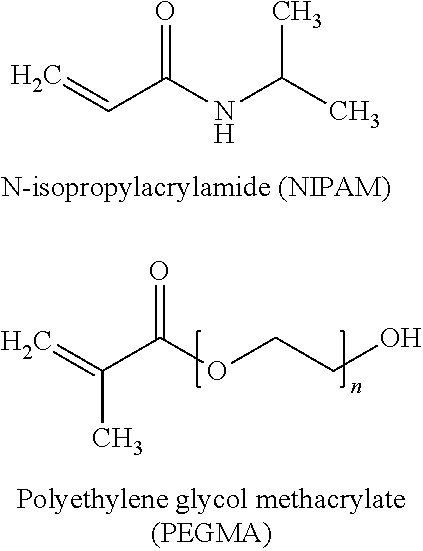Textile Care Product Having An Optionally Cross-Linked Copolymer And Method For Finishing Textiles
a technology of textile care and cross-linked copolymer, which is applied in the direction of detergent compositions, detergent compounding agents, chemistry apparatus and processes, etc., can solve the problems of large difficulty or significant effort, stained textiles, etc., and achieve the effect of reducing the re-soiling of textiles and improving the removal of soiling from textiles
- Summary
- Abstract
- Description
- Claims
- Application Information
AI Technical Summary
Benefits of technology
Problems solved by technology
Method used
Image
Examples
example 1
n of NIPAM-Co-PEGMA
[0056]A copolymer consisting of N-isopropylacrylamide units, poly(ethylene glycol) methacrylate units and cross-linking agents (in short: NIPAM-co-pEGMA polymer) was prepared following the below preparation instructions:
[0057]A solution of 10.08 g (5 mmol) of poly(ethylene glycol) methacrylate (PEGMA) in 140 ml of degassed water was added, with constant stirring, to a solution of 18.72 g (165.4 mmol) of N-isopropylacrylamide (NIPAM) and 0.79 g (5.1 mmol) of N,N′-methylenebis(acrylamide) (BIS) in 940 ml of degassed water, which solution had been heated to 90° C. under a nitrogen atmosphere. A solution of 0.36 g (1 mmol) of cetyltrimethylammonium bromide (CTAB) in 100 ml of degassed water was then added. A solution of 0.7 g (2.6 mmol) of 2,2′-azobis(2-methylpropionamidine)-dihydrochloride (AAPH) in 20 ml of degassed water was also added so as to start the polymerization reaction. The reaction mixture obtained was constantly stirred (300 rpm) for 4 h at 85° C. under ...
example 2
xtile Care Products
[0059]The following textile care products were prepared by mixing the constituents shown in Table 1. Textile care products V1 and V2 are not formulations according to the invention and are used as reference, whereas textile care product E1 represents an embodiment according to the invention which contains a copolymer consisting of N-isopropylacrylamide units, poly(ethylene glycol) methacrylate units and a cross-linking agent. The copolymer from Example 1 was used as the copolymer.
TABLE 1Composition of textile care products [% by mass]V1V2E1Boric acid111Citric acid2.22.22.2Anti-foaming agents0.030.030.03Surfactants181818Fatty acid from palm kernel oil2.252.252.25NaOH2.3342.3342.334Glycerol2.52.52.5Preservatives0.050.050.05Ethanol1.251.251.25Phosphonate DTPMP0.50.50.5Brightener0.0350.0350.035Enzyme mix0.8360.8360.836Perfume0.7410.7410.741Dye0.0060.0060.006Poly-NIPAM—1—NIPAM-co-PEGMA——1Waterto make up to 100
[0060]The pH of the textile care products was between 8.2 an...
example 3
ase Effect
[0061]3.5 kg of clean ballast laundry (including the following test textiles: pillow, jersey, kitchen towel) was washed three times with 66 ml of one of the textile care products (V1, V2, E1) from Example 2 in a Miele W 918 Novotronic® with a washing volume of 17 L and a water hardness of 16° dH at 40° C. After the washing process, the laundry was air-dried.
[0062]The test textiles were then soiled with standardized soiling and stored at room temperature for 7 days. The test textiles were then washed again under the conditions described above together with the remaining ballast laundry in a wash liquor which contained 66 ml of the same textile care product from Example 2 as previously used. The remaining stain intensity was determined using a DATA COLOR Spectra Flash SF500 remission spectrometer.
[0063]Table 3 shows the obtained test results with regard to stain intensity.
TABLE 3Results with regard to stain intensitySoilingTextileV2E1Make up 1Cotton8.014.4Make up 2Cotton3.67...
PUM
| Property | Measurement | Unit |
|---|---|---|
| total mass | aaaaa | aaaaa |
| lipophilic | aaaaa | aaaaa |
| hydrophilic | aaaaa | aaaaa |
Abstract
Description
Claims
Application Information
 Login to View More
Login to View More - R&D
- Intellectual Property
- Life Sciences
- Materials
- Tech Scout
- Unparalleled Data Quality
- Higher Quality Content
- 60% Fewer Hallucinations
Browse by: Latest US Patents, China's latest patents, Technical Efficacy Thesaurus, Application Domain, Technology Topic, Popular Technical Reports.
© 2025 PatSnap. All rights reserved.Legal|Privacy policy|Modern Slavery Act Transparency Statement|Sitemap|About US| Contact US: help@patsnap.com

